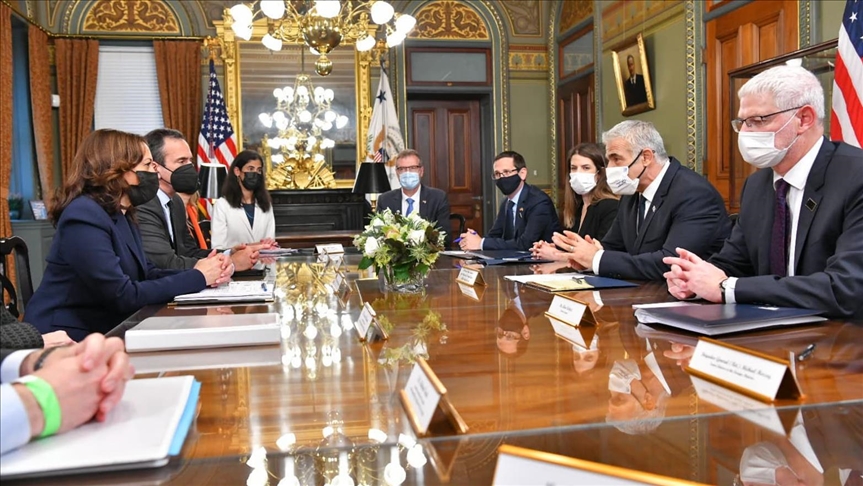US affirms 'strength,' 'endurance' of bilateral ties with Israel
Iran at center of discussions between US vice president and Israel's top diplomat
 Photo Credit: https://twitter.com/yairlapid
Photo Credit: https://twitter.com/yairlapid
WASHINGTON
US Vice President Kamala Harris on Tuesday reaffirmed the "strength and the endurance" of the bilateral relationship between Washington and Tel Aviv during a meeting with Israeli Foreign Minister Yair Lapid.
Speaking ahead of their meeting, Harris said the US-Israel relationship is "unwavering, a relationship that is based on shared values, shared history, and a shared concern for the mutual safety and security of the people of our two countries."
"We will also discuss, of course, what we must do to strengthen those relationships and…in particular, security concerns that Israel always has had and continues to have, and our commitment to ensure the security of the people of Israel," she said.
In addition, Harris said she and the top diplomat discussed the "issue of peace, security, and prosperity for Palestinians as well as Israelis, and, of course, the regional challenges that we face," as well as normalization agreements struck by former US President Donald Trump between Israel and several Muslim-majority nations, which Harris said she and President Joe Biden "strongly support."
Lapid, for his part, said that even when there are differences between Washington and Tel Aviv, the two nations mutually "know that our goal is common, which is to see Israel strong, secure, and thriving."
"It's true that the center of my visit is the Iranian nuclear program, but it deals with one more thing: strengthening our bipartisan relationship with the next generation of young Americans," he said.
Biden has attempted to bring the US and Iran back to mutual compliance with the 2015 Joint Comprehensive Plan of Action (JCPOA), which placed an unprecedented international inspection regime on Iran's nuclear program in exchange for billions of dollars in relief from economic sanctions. The effort to return to compliance has been vocally opposed by Israel.
Trump unilaterally withdrew from the pact in 2018 and went on to pursue what his administration called a "maximum pressure" campaign against Tehran geared at bringing Iran back to the negotiating table by reimposing sanctions and adding new ones to a laundry list of penalties, which was ultimately futile. Iran, in retaliation, stepped back from its commitments under the agreement.
In addition to meeting with Harris, Lapid also sat down with Biden's national security adviser Jake Sullivan, who "reaffirmed President Biden’s commitment to ensuring that Iran never gets a nuclear weapon," National Security Council spokeswoman Emily Horne said in a statement.
"The officials agreed that the United States and Israel will continue to consult closely on Iran and other critical matters impacting the security and stability of the region," she added.








